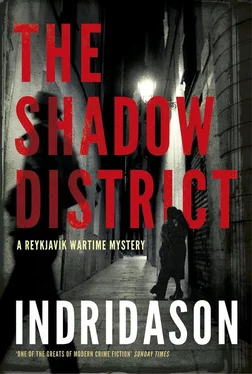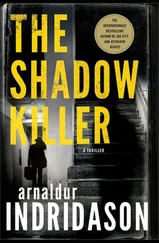Arnaldur Indridason
The Shadow District
The police decided to enter the flat, but rather than break down the door they called a locksmith, figuring that a few minutes either way were unlikely to make a difference.
A neighbour had raised the alarm. She didn’t dial the police emergency number but instead rang the main switchboard and informed the officer who took her call that she was a little worried as she hadn’t seen her next-door neighbour for several days.
‘He tends to drop in before he goes shopping,’ she said. ‘And I usually hear him coming and going, or spot him from my window walking to the shop, but I haven’t seen him or heard him at all in the last few days.’
‘Could he have gone out of town?’
‘Out of town? He never leaves town.’
‘Or to visit friends or relatives?’
‘I don’t think he has many friends, and he’s never mentioned any relatives.’
‘How old is he?’
‘About ninety. But fit. He looks after himself, runs all his own errands.’
‘Could he be in hospital?’
‘No, I... I’d have noticed. I live right across the landing from him.’
‘Or could he have moved into a home? Sounds like it wouldn’t be before time.’
‘I... goodness, what a lot of questions. I can’t answer them all. But not everyone wants to just shuffle off into a home, you know. He’s in very good health.’
‘All right, thank you for ringing, dear. We’d better send someone round.’
Now there were two police officers standing outside the old man’s door, waiting for the locksmith. The neighbour, whose name was Birgitta, was there as well. One of the officers had a prominent paunch; the other was much younger and so thin his uniform hung off him. They looked almost comical as they stood there chatting on the landing. The fat man, who was older, was the more experienced of the pair. This wouldn’t be the first time he’d had to enter the home of a vulnerable elderly person who lived alone. Several times a year the police received requests to check up on people who had fallen through the gaps in the welfare system. The locksmith, Ómar, was one of his cousins and could pick a lock in seconds.
Ómar appeared on the landing and they exchanged cousinly greetings. All it took was a quick tinker with the lock and the door opened without a hitch.
‘Hello!’ the fat cop called into the flat.
There was no answer. Telling his cousin and the woman from next door to wait outside, he beckoned his partner to follow him in.
‘Hello!’ he called again. Still no reply.
The policemen made their way cautiously into the flat. The fat cop sniffed the air. The smell that greeted them was bad enough for both men to clamp their hands over their noses. All the curtains were drawn and the lights were on in the hall, kitchen and sitting room.
‘Hello!’ called the thin officer, a little shrilly. ‘Anybody home?’
No answer. The locksmith and Birgitta waited obediently outside the door.
The kitchen was small but tidy. There was a table with two chairs drawn up to it, and a coffee maker on the counter by the sink, its jug half full. It was switched off. In the sink were a bowl and two cups. There was a small fridge at one end of the room, and an old electric cooker with three hobs. A glance into the sitting room revealed a sofa and matching chairs, a coffee table and a desk by the south-facing window. There were books on the shelves but few ornaments. The sitting room was as neat and tidy as the kitchen.
The flat was carpeted throughout, with the exception of the lavatory and kitchen, and the wear and tear on the paths between the rooms was obvious. In one place the carpet was worn right through to the white threads that held it together. Next, the policemen opened the door to the bedroom and there, stretched out on top of a single bed, lay a man with eyes half closed, his arms down by his sides. He was dressed in shirt, trousers and socks, and looked for all the world as if he had decided to take a nap in the middle of the day and never got up again. Flat on his back like that, he didn’t look ninety. The older officer went over to the bed and felt for a pulse in his neck and wrist. You could hardly imagine a more polite death, was the first thought that crossed his mind.
‘Is he dead?’ asked the skinny cop.
‘Looks like it,’ said his partner.
Birgitta, unable to restrain herself any longer, tiptoed inside and peered into the bedroom where her neighbour was lying in tranquil solitude.
‘Is he... dead?’
‘I think we can be confident of that,’ said the older officer.
‘The poor, dear man, he must be glad to be at peace,’ she said quietly.
Later that day the body was transferred to the National Hospital morgue where it was received and duly registered by the pathologist. According to procedure, the district physician had been called to the flat and pronounced the man dead at the scene. His death was not being treated as suspicious and no police inquiry would be judged necessary unless something untoward came to light during the post-mortem. In the meantime the flat was secured and the door would remain sealed until the pathologist’s report was available.
The pathologist, whose name was Svanhildur, put off the post-mortem until later in the week. The matter wasn’t urgent, and she had more than enough to do as it was before her upcoming three-week holiday to an attractive Florida golf course.
Two days later she slid the body out of the refrigeration unit and transferred it to the dissection table. A small group of medical students was there to observe the post-mortem and she went over the examination with them point by point. She filled them in on the circumstances: the body had been found after a neighbour notified the police; everything indicated that the man had died of natural causes. Nevertheless, she managed to engage the students’ interest to the extent that one even briefly stopped listening to his iPod while she was talking.
Svanhildur was working on the assumption that the cause of death was cardiac arrest, and it turned out that she was right. The man had died of a heart attack. The problem was that she couldn’t see any reason for it.
She examined his eyes.
Took a look down his throat.
‘Aha,’ she murmured, and the students leaned in closer over the table.
They hurried past the sandbagged sentry post in front of the National Theatre. She tried not to make it obvious that they were together, at least not while they were walking down the busier streets. Her parents had been furious when they learnt of the relationship and demanded that she break it off immediately. Her father had actually threatened to throw her out of the house, and she knew he would be as good as his word. She had been unprepared for such a violent reaction. Yet, unwilling as she was to defy her parents, she stubbornly resisted ending the relationship. Instead, she stopped talking about him and let them think it was over, but she carried on meeting him in secret.
There were few places to go if they wanted to be together. Back in late autumn, when they had first started courting, they had gone to Öskjuhlíd hill when the weather was fine. But now, in the depths of winter, their options were very limited. Checking into a hotel was out of the question, and so were the barracks. Once before they had resorted to the back of the National Theatre after nightfall. The building loomed darkly over Hverfisgata like the huge outcrop of columnar basalt it was designed to resemble, though it was in fact no more than a hollow shell. Work had halted on the ambitious project ten years ago with the onset of the Depression, and when the British occupied Iceland in 1940 they had requisitioned it as a supply depot, a role it had retained when the Americans took over in 1941. Now it was a popular meeting place for illicit lovers.
Читать дальше












